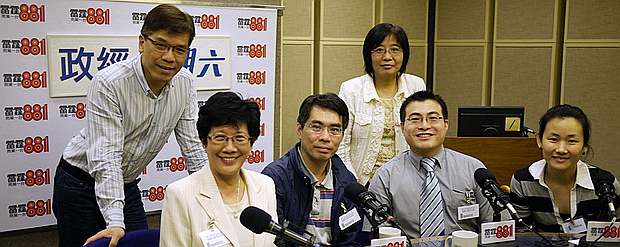|
|
|
|
|
|
|
PolyU renders support for post-quake reconstruction in Wenchuan |
|
|
PolyU renders support for post-quake reconstruction in Wenchuan
|
It has been two years after the May 2008 Wenchuan earthquake. Prof. Angelina Yuen, Vice President (Institutional Advancement and Partnership) (second from left in above picture), was recently invited to a Commercial Radio programme to talk about PolyU’s relief work after the quake. This issue briefly covers the content of the interview, and interested parties can obtain more information from http://www.881903.com/page/zh-tw/BrowseSchedule.aspx?ItemId=63 Q: Could you let us know more about PolyU’s relief work after the earthquake in Wenchuan? A: Shortly after the disaster, PolyU and Sichuan University signed a cooperation agreement to jointly establish the “Sichuan Post-disaster Reconstruction Support and Research Centre”. Under the Centre, four task forces on Health Services, Psychological Counselling and Social Reconstruction, Construction and Engineering Technologies, and Economic Reconstruction have been formed to provide services in different areas. Q: How did PolyU provide relief assistance on the mainland? A: PolyU has mainly adopted a “train-the-trainers” approach in our services. As we will not be able to stay long in the disaster areas to provide service, we provided short-term and medium-term training to local people so as to help train professionals there. In the long-run, PolyU and Sichuan University are planning to establish a Post-quake Reconstruction and Management Institute, so as to provide training in disaster areas and different areas on the Chinese mainland. In case of future disasters, there will be enough professionals to provide training services. Q: Any inspiration from the relief work by different parties? A: At first, the reconstruction work was more focused on such hardware as building houses, roads, schools and hospitals, while putting less efforts on software such as, training of professionals who were urgently needed in the disaster areas. We all learn from each other, and gradually we understand that the hardware and the software are equally important. Furthermore, we understand that during the reconstruction process, we must have cross-disciplinary and cross-professional co-operation in order to provide comprehensive rehabilitation and reconstruction services. Q: How can we provide long-term assistance to the victims? A: At the first stage, PolyU mainly worked on disaster relief. Now, PolyU mainly assists in post-disaster community reconstruction, helping the victims to establish a self-help capacity to cope with their living. At the same time, we try to help them build hope for the future, for example, we had recently invited students and teachers of an art group from Hanwang Primary School, which is located in the hardest-hit Mianzhu city, to visit Hong Kong, and they performed a number of wheelchair dance. It is hoped that through art, the recovering students will interact with people, enhance their self-confidence, and further demonstrate their indomitable spirit.
|
